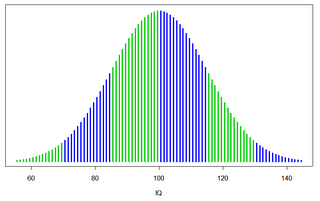-Η ζωή μιμείται την τέχνη. Ξεδιάντροποι καθηγητές πανεπιστημίου και κυνικά μέσα ενημέρωσης μοιάζουν σαν να έχουν βγει από βιβλίο του Χωμενίδη. Η πολιτική σαν τέχνη –και σε αυτή την περίπτωση, σκληροπυρηνικός σουρρεαλισμός.
-Ο χρόνος και ο χώρος είναι μη-γραμμικές διαστάσεις. Μερικοί πολιτικοί από το λαϊκίστικο στρατόπεδο φαίνεται να έχουν πιαστεί σε μια χωροχρονική ανωμαλία και έχουν κολλήσει στα 80s. Οι φοιτητές εδώ, ζούνε ταυτόχρονα σην Βόρεια Κορέα, στην Σοβιετική Ένωση ή σε κάποιο άλλο παράλληλο κόσμο.
Let’s imagine however for a moment that miraculously Greece suddenly overcame the Papandreou mentality and allowed private education. The improvement would be marginal unless one more crucial change takes place: The introduction of intelligence assessment in education.
Let me explain:
In our society we assume that intelligence (in its traditional definition of IQ) is socially determined and in the tabula rasa school of thought, all people are born with exactly the same intelligence potential. As a result, in the primary and secondary education, all students are offered exactly the same education. Consequently the education level equilibrates somewhere between the average of the students and the least common denominator (much below average). result is the more gifted students are underutilized and undereducated while the weaker ones struggle to cope with demands beyond their level. It is like offering the same basketball education to the whole population irrespectively of their natural advantages like height or physical strength. We can’t go far with that policy.
In the rare instances that our educational system has to assess students, like when entering the tertiary education, it uses mostly irrelevant measures like the ability to memorize that can actually correlate negatively with IQ. The result is that our top public universities are filled with students that are disciplined and excel in areas like memorization but are not necessarily the most gifted of their generation. Combined with the lack of competition from a private sector, our tertiary system fails to produce a “cognitive elite”, or even graduates with marketable skills. Low salaries and high unemployment are unavoidable.
The source of the problem is the initial assumption: that IQ is relative and people are born with the same intellectual capacity. However, modern psychology has shot down this popular 20th century myth (for a summary of recent developments read here). An anathema to egalitarians and proponents of social engineering, intelligence is widely admitted that not only exists in absolute terms but it is the best predictive factor for academic and social success. This is even more true in the knowledge-intensive societies. Yes, there are other important factors for success, from social (soft) skills to motivation, but they build upon or intelligence.

What then should be an efficient educational system based on modern psychology and the proven role of varying genetic predispositions in IQ? It should be one that recognizes that not all people are the same and offers the appropriate education for each segment. The only way to offer this targeted education is to use extensively IQ tests (1) in all levels of education. These tests will be part of a wider screening process that can also include measures or proxies of social skills, motivation, discipline etc. Students then will be grouped with classmates of similar potential and the education process will better fit the needs of the students. Then, top schools will offer in the market the real scare resource in the value chain of our knowledge based society: well-polished intelligence. This is what the various companies are really buying when they spend huge sums to recruit from the best schools (2).
Intelligence adjusted education is already happening in many countries, notably in US (3). Given its huge benefits to societies, sooner or later it will spread in the whole world.
In Greece, where decades of socialist ethos have virtually eliminated the upside potential of gifted students, reforming education on a meritocratic non-egalitarian basis is a great opportunity to unlock our potential and catch up with the rest of the advanced countries. We cannot stay behind once more. At the end, we owe it to our history.
______________________________
(1) IQ is an “absolute” quality nobody can be proud for a low IQ –unlike “relative” qualities like hair color for example. Thus, these tests should be called in a more neutral and politically correct way, maybe “aptitude” tests
(2) This is more true in some sectors like banking where the ROIs of the banks directly correlate with the IQ of their employees -see the case of Goldman Sachs.
(3) The widely used GRE, GMAT, SAT tests, despite their euphemistic names, are nothing more than intelligence screening tools.

2 comments:
hmm while I agree that not everyobody has to receive the same education I am sceptical about the use of IQ tests in Greece.
If they are used just in the place of today's system it will be a disaster more or less, giving underqualified students zero chances to study and become upwardly mobile. In the US there is a lot of space for everyone who wants to study, so the SATs are a selection system (who will study where), not an exclusion system (who will study).
But in Greece there is a big deficit in education supply... IQ tests should be used only by some top, research institutions (or by new private universities). The others should allow for effort to overcome mental disadvantages...
Fair point, but I see these tests not as the only measure but as an important part of a better evaluation package.
Given that the number of supplied spots will be the same and there will be no cut rate, the same number of students will study; the difference will be a more efficient allocation of spots and resources and a better educational product.
Post a Comment